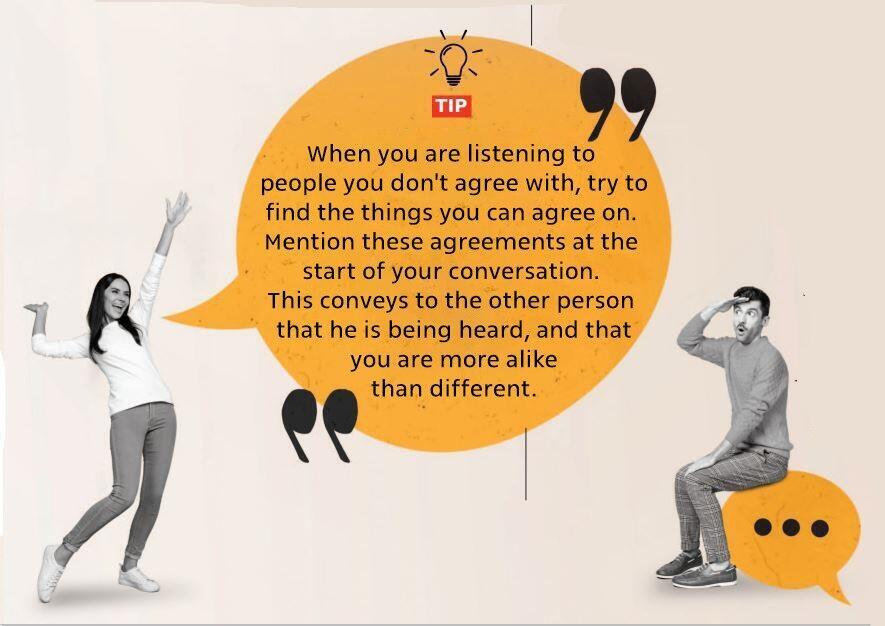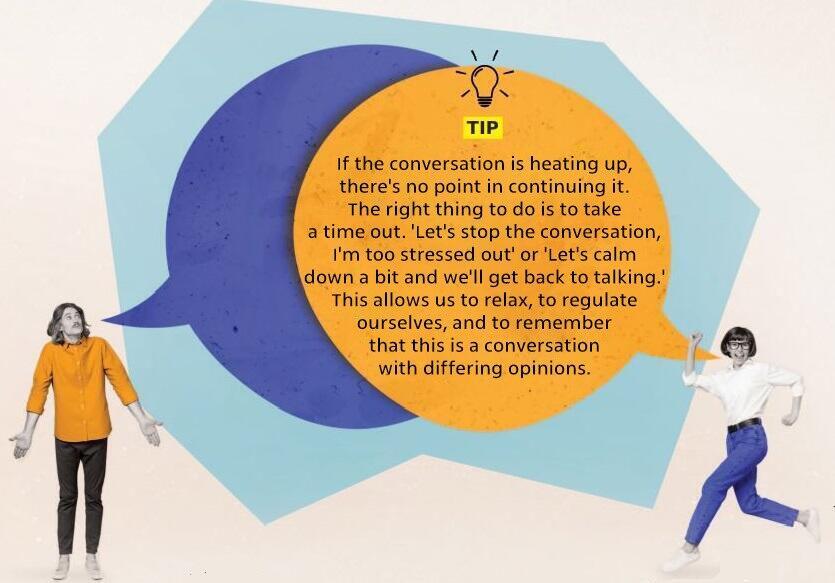Getting your Trinity Audio player ready...
1. You talk more and listen less
When you talk too much you may be perceived by your interlocutors as bossy. You also risk that they will very quickly lose interest in talking to you because they will not feel like equal partners. In addition, while you are immersed in talking, you miss an opportunity to receive information that may be useful to you.
More Stories:
How to improve: In the next conversation, adopt this rule of thumb: say only about 20% of what you want to say and focus on the messages that are most important to you. Our attention span is short, so it is important to focus on the important things first.
3 View gallery


Say only about 20% of what you want to say and focus on the messages that are most important to you
(Photo: Shutterstock)
Devote the rest of the time to active listening which means listening that indicates interest and understanding. When someone speaks, you listen to them quietly, try to understand the intention and respond accordingly with sentences like: "What did you mean when you said..." or "Did I understand correctly?"
2. Operate in multitasking mode
If you think you can have an in-depth conversation while scrolling through Instagram or through a WhatsApp message, you are wrong. Neuroscience studies show that when it comes to tasks that require cognitive effort, our brains cannot do more than one thing at a time. Attention constantly switches between one task and the other, meaning that there is a decrease in the quality of both tasks.
In addition, a quality conversation is characterized, among other things, by eye contact between the parties. Therefore, when you are focused on another action, naturally you pay less attention to the other party and perhaps even convey to them a message that they are not important enough.
How to improve: Try to step into the shoes of your interlocutor. How would you feel if someone kept typing while you were addressing them? In the next conversation, put the cell phone aside and devote yourself to only one thing – the conversation itself. If it is possible and it is an important conversation, it is also advisable to mute the cell phone.
3. Interrupting the other's words
Interrupting the other person's words is not only interpreted as rudeness, but it also stifles the other party's train of thought and thus impairs the quality of the conversation and perhaps also the goals you want to achieve through it.
How to improve: The best option is to wait until the end of the conversation and then ask the other person's permission to refer to what was said. But if you didn't hold back and interrupted the other person's words to correct something immediately or add relevant information, try to minimize damage – shorten the time of the outburst, apologize for it and ask the other party to continue the conversation from where they left off.
4. Too busy being right
During an argument, you don't really listen because you are busy with one thing only: proving to the other side that you are right. You tend to get fired up and channel all your turbulent energy into finding "holes" in the opposing arguments in order to thread your righteous claims into them.
In this way, not only will it be difficult to move the other party from their position, you may even leave them with a bad feeling at the end of the conversation.
How to improve: We live in a complex reality, and in most issues, you will find that each side is neither right nor wrong. Each and every person has a unique worldview and point of view. Try to come to the conversation with a desire to learn something new from your interlocutor, even if you don't agree with them.
5. Cheer up the other party too early in the conversation
You know how to listen and contain pain, so people tend to share with you the challenges they face. It is obvious that they are upset or experiencing distress, but in an attempt to cheer them up, you rush to pull out similar stories that had a happy ending.
But sometimes people need time to process the experience and understand what actually happened. In such cases, your attempt to mask the pain can leave them feeling that you are canceling their experience of pain.
How to improve: sometimes all the help that is needed from you is just listening. Do not offer your opinion if you have not been asked for it, and also do not volunteer stories about people who had the exact same experience.
When will you know it's time to move from the listening stage to the encouraging stage? When the other party repeats their story again or when they hesitate out loud or ask your opinion.
6. Use too much high-level language
Rich language can generate a lot of interest and has a considerable contribution to the conversation, provided the other party understands the meaning of the words.
If you often use high-level or foreign words without the other party understanding their meaning, you may lose their attention early in the conversation.
How to improve: Your tendency to use your spectacular vocabulary may be done in good faith, but it is important to be aware of it. To create value in the conversation without belittling the other party, you can occasionally combine a word in dialect and immediately after it indicates the translated word (for example: in retrospect, or looking back...).
7. Make yourself the center of attention
One of the common mistakes during a conversation is to repeatedly shift the conversation toward you with a story or anecdote that glorifies you or your close associates.
For example, when the other party excitedly tells you about a car accident they were involved in recently, you hurry to tell them about an accident you had. When they want to share with you the argument they had with their child, you tell them how you managed to educate your children well.
When a person starts to share their personal experience, they need the stage you offer them, your attention. If you divert the conversation to you, you not only rob them of that space but also demand their attention.
How to improve: Internalize the fact that you will never be able to tell all the experiences you've had in life, but every story will have its time to come out. Be patient and give each interlocutor their stage.
Paradoxically, precisely when people give the other party more time to share their experiences without interruptions, they are perceived as more pleasant and interesting interlocutors.
8. Don't pay attention to the tone and nuance of speech
You don't mean to offend the other party, but sometimes it can be the tone of voice, nuance of the words or a facial expression that expresses disdain.
Sometimes it's a lack of tact or insensitivity, and sometimes you hurt the other side when you take a judgmental approach or use generalizations ("all those who didn't enlist are parasites"). The result: discomfort to the point of clamming up on the other side.
How to improve: You cannot turn back time, and what is said is said, but increasing awareness of tone, body language and the use of generalizing and judgmental words may help you avoid this in the next conversation. And if you feel that you had an inappropriate response, just take responsibility and apologize.
Professional advice: Ariel Shaar Mendel, attorney, certified marriage and family therapist



